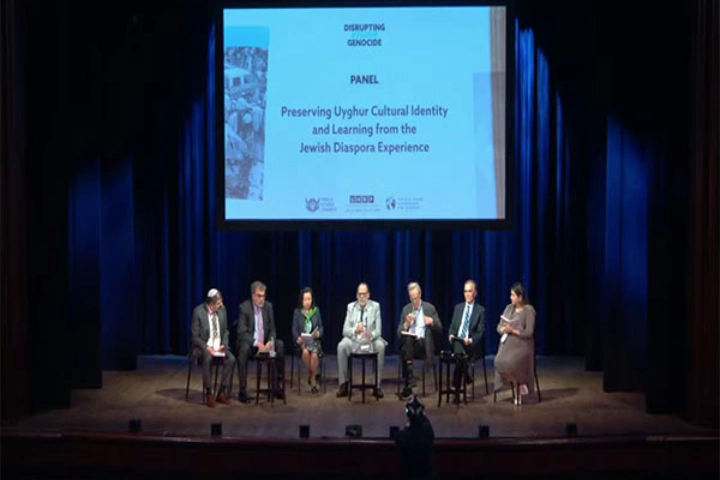Representatives from Jewish and the Uyghur communities in New York jointly discussed how the refugees of these diasporas can live their lives in the US. Jews supported Uyghur emigration to and resettlement in the United States through their synagogues.
The Elie Wiesel Foundation for Humanity, an independent non-profit organisation from the US, organised a joint conference on Wednesday titled ‘Disrupting Uyghur Genocide’ in New York, the Elie Wiesel Foundation said in a statement.
In the conference, the delegates of the World Uyghur Congress, educators, religious leaders from the Jewish community and heads of non-profit organisations from all around the world participated.
During the conference, the representatives of both communities jointly discussed how the refugees of these diasporas can live their lives in the US after fleeing from an ongoing genocide. The speakers also discussed, what both of these communities can learn from each other and how their cultures and languages can be protected from total extermination.
Uyghur refugees are facing an unprecedented campaign of harassment and intimidation in the form of China’s transnational repression, rendering Uyghur refugees as potentially the most at-risk refugee population in the world in a non-militarized context.
Mediated by Rabbi Bob Kaplan, the Executive Director of the Center for Shared Society, the first session of the conference witnessed a healthy discussion over how refugees from East Turkistan after fleeing to the US can embrace their Uyghur identity in foreign lands, how the culture, traditions, and language of the Uyghur community can be protected when China is hellbent on destroying Uyghur community from existence.
Several governments around the world, including the U.S. and Canadian governments, have recognized the perils facing Uyghur refugees escaping the genocide in East Turkistan, and are offering the prospect of resettling a significant number of Uyghur
The speakers in their statement also emphasised how current-day China is strategically suppressing the Uyghur community of East Turkistan through its strategic genocide in the area.
During her statement, Irada Kashkeri, an educator and a representative from a social organisation that helps Uyghur individuals in the US, stated that she frequently meets young Uyghur kids and young adults who feel reluctant and embarrassed to proudly represent themselves as Uyghurs.
While underscoring the reason for this, she insisted that there is still a minor reluctance on both sides, as the people in US don’t know about the culture of the Uyghur community, and back in China, the Uyghur community is suppressed.
She further mentioned, “In China right now, in East Turkistan they are tearing our Uyghur culture away. They are making us afraid to say that we are Uyghur. And that is not something that we can continue here in US”.
Kashkari, in her statement about helping Uyghur youngsters settle in the US also mentioned that “We want to create a future generation for whom the questions related to Uyghur identity are not uncomfortable, and our schools must be beyond just students and classes, it must be a center for generational knowledge. Where families can come together for more than just education. Our young ones understand why their parents cry because they cannot contact their relatives back home, they understand why everyone else visits their grandparents and they cannot. This impacts how they view there Uyghur identity”.
Rishat Abbas President of the Global Uyghur Academy and senior advisor to the World Uyghur Congress, emphasised, “Under the Chinese regime, our people don’t know about democracy. Since 2017, the world has witnessed that the Chinese Communist Party has been conducting active and ongoing genocide and has been targeting Uyghur and east Turkish people, in our homeland, East Turkistan, and this is the biggest challenge for preserving our language.”




















